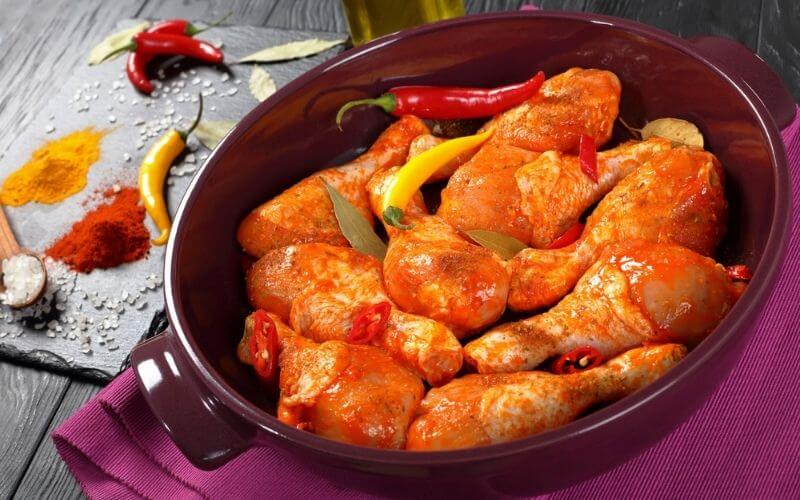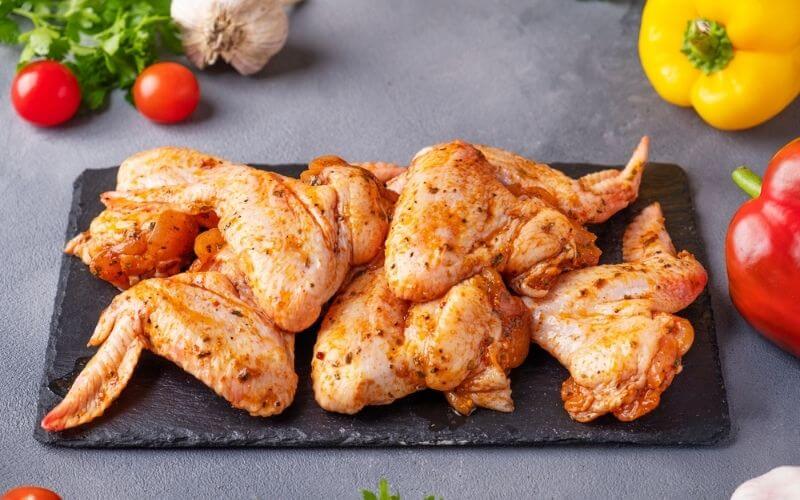Does your chicken taste off or seem stringy? The key might lie in understanding the art of marination. Let’s dive into the science and flavor of marinating chicken to perfection.
You may also like: How long does beef jerky last in the fridge
What is Marination?

Anytime a recipe requires marinating chicken, anticipation is in the air. Marinating chicken doesn’t just add flavor; it can transport you across the world in culinary terms.
- Fancy Indian cuisine tonight? Drench your chicken in a delectable yogurt-garlic-garam masala mix.
- Craving Italian? Combine olive oil, balsamic vinegar, and oregano for an easy, delightful marinade.
- In the mood for Japanese? A teriyaki sauce marinade for your chicken thighs will rival any takeout.
However, the real question is: How long can chicken marinate? We often think the longer the chicken marinates, the juicier it becomes. But, is that really the case?
The Purpose and Science of Marination
Marination is more than just soaking food in flavorful liquids. It’s a science that, when done correctly, can enhance the texture and taste of your dish.
What Exactly Is Marination?
Marination, or marinating, is about soaking foods, typically meats or veggies, in a liquid rich in flavors before cooking. The components of a marinade vary, but they usually have:
- Acids: Think lemon juice, vinegar, or yogurt.
- Spices & Aromatics: These provide the primary taste profile.
- Flavored Oils: Like sesame, olive, or mustard to enrich the mixture.
Marinades might also include ingredients like tahini, beer, or even purees made from peppers, garlic, or onion. Remember to season with salt, pepper, and maybe some finely diced herbs like coriander, parsley, or mint.
Tenderizing is another critical role of marination. Some ingredients, such as pineapple or papaya, contain enzymes that break down tough fibers in the meat, making it softer.
Debunking the Marination Myth
A common misconception is that longer marination allows deeper flavor penetration. This is not entirely accurate. The marinade primarily seasons the chicken’s surface, irrespective of the duration. Marination serves two primary purposes:
- Tenderizing the Meat: The acid in the marinade breaks down tough tissues, allowing the meat to absorb more moisture.
- Enhancing Flavor and Cooking: When the chicken hits the heat, the marinade starts cooking immediately. This protects the chicken from drying out, and sugars in the marinade caramelize, enhancing the flavor.
Marinating Chicken: Best Flavors to Choose

Chicken, especially parts like the breasts and thighs, can be pretty bland on their own. This is where marinades give a massive flavor boost and prevent your chicken from being a boring or repetitive meal. If you don’t have time, you can easily get ready-made marinades. The best store-bought marinades for chicken include McCormick’s Grill Mates marinade in Mojito Lime, Garlic Herb & Wine, and Chipotle Pepper Mix.
But for next-level flavor and texture (and all the customizability), you’re better off making chicken marinades from scratch. Here are a few to get you started:
- Store-Bought: For those short on time, brands like McCormick’s Grill Mates offer marinades in flavors like Mojito Lime or Chipotle Pepper Mix.
- DIY Marinades: Crafting marinades at home lets you play with flavors. Here are some to get you started:
- Simple Garlic Paprika Marinade: Mix olive oil with herbs, add garlic, salt, and paprika. Add red pepper flakes for a kick.
- Tandoori Marinade: Requires Greek yogurt, citrus juices, turmeric, cayenne, garlic, ginger, salt, and garam masala.
- Fajita Marinade: A mix of olive oil, vinegar, lime juice, and spices like chili powder, cumin, paprika, garlic, and onion.
- Honey Soy Marinade: Blend soy sauce, mirin, sesame oil with honey, some cider vinegar, and ample garlic.
For insights into reheating marinated chicken to retain its flavor, check out our guide here.
Health and Chicken Marination
Marinating isn’t just about taste. It can be a healthy choice too.
- Marinades reduce carcinogenic heterocyclic amines (HCAs) in meats, especially when grilled.
- Acids in marinades can neutralize some harmful bacteria.
- Tenderizing ingredients make the meat softer and more digestible.
For more on the shelf life of cooked chicken, read our article here.
Best Foods to Marinate
Chicken isn’t the only thing you can marinate. Here are a few other foods that you can transform by soaking them in a marinade:
- Lamb, beef, or pork.
- Tofu or seitan
- Paneer and certain hard cheeses
- Fish (whole or fillets)
- ‘Meatless’ meat substitutes
- Mushrooms
- Hardy vegetables like zucchini, carrots, potatoes, eggplants, and squash
When it comes to marinating steak, people are pretty divided on this. Should you marinate steak? This is a tricky question. Do you need to marinate steaks? No, steaks work fine just on their own.
Steak puritans are adamant that steaks should not be marinated. But if you want, you can marinate your steaks before grilling them or pan-frying them. This will add flavor, give you a better crust, and make it much more tender.
Making Healthier Chicken Marinades
If you’re on a diet or trying to eat healthier, some marinades can be off-limits. Things with lots of oil, sodium, or sugar are pretty unhealthy, especially when consumed regularly. Instead, you can try something that is less heart-attack-inducing.
As a simple rule, reduce the amount of marinade you make. If a recipe makes two cups of the marinade, just cut the recipe in half. As long as you coat all the surfaces of the meat, you still get all the flavor.
If your marinade recipe requires lots of sugar, molasses, or honey, reduce the amount called for. Cut it by half or even three-quarters. The same goes for sodium-heavy ingredients like oyster or soy sauce or even salt!
Make healthier marinades. Simple 3-or-4 ingredient marinade without lots of sugar, salt, or saturated fats is the best way to keep your chicken marinades healthy.
Just combine equal parts olive or avocado oil and lemon/lime juice and add aromatics and the seasoning of your choice. Things like fajita seasoning, tikka masala mixes, and Italian herb mixes are great places to start.
Simple Middle-Eastern-inspired marinades are also relatively healthy. You can use low-fat yogurt, olive oil, some lemon juice, and spices like turmeric, cumin, smoked paprika, ground cinnamon, and a touch of nutmeg.
Even something like a squeeze of fresh lemon juice, salt, pepper, and some mustard can add a ton of flavor to your chicken without all the pesky calories.
How Long to Marinate Chicken: The Final Verdict

We’ve covered the whys and hows of marination. Now, for the pressing question: how long is too long?
While many suggest marinating chicken overnight, does it imply that 48 hours yield even better results? Simply put, longer isn’t always better.
For in-depth guidance on chicken shelf life post-cooking, explore our article.
Still Have Questions?
Here you’ll find answers to questions people tend to have about marinating chicken.
01. Can I Marinate Chicken for Too Long?
Marinating chicken for too long is definitely possible and will make your chicken lose its texture.
02. How Long Can I Safely Marinate Chicken in the Fridge?
You can safely marinate the chicken in your fridge for 24-48 hours. Anything longer and you risk an upset stomach or even food poisoning.
03. How Can I Tell If Marinated Chicken is Bad?
If your meat has the following signs, it has gone bad and needs to be thrown out:
- It feels slimy.
- There is a weird or funky smell coming from the chicken.
- There are spots of discoloration.
- The meat looks grayish.
- It’s been in the fridge for more than 2-3 days, or in the freezer for over 4 months.
04. Should I Marinate My Chicken Overnight?
Yes, overnight or 12-hour marination usually gives the best results for chicken.
05. How Long Does Marinated Chicken Last in the Fridge?
You can store marinated chicken in the fridge for 2 days or up to 48 hours before it goes bad.
Conclusion
Understanding the science of marination can transform your chicken dishes. While the flavors are vital, it’s crucial to marinate for an optimal duration to get the best out of your poultry. Dive deeper into chicken care with our array of articles and elevate your culinary game.
